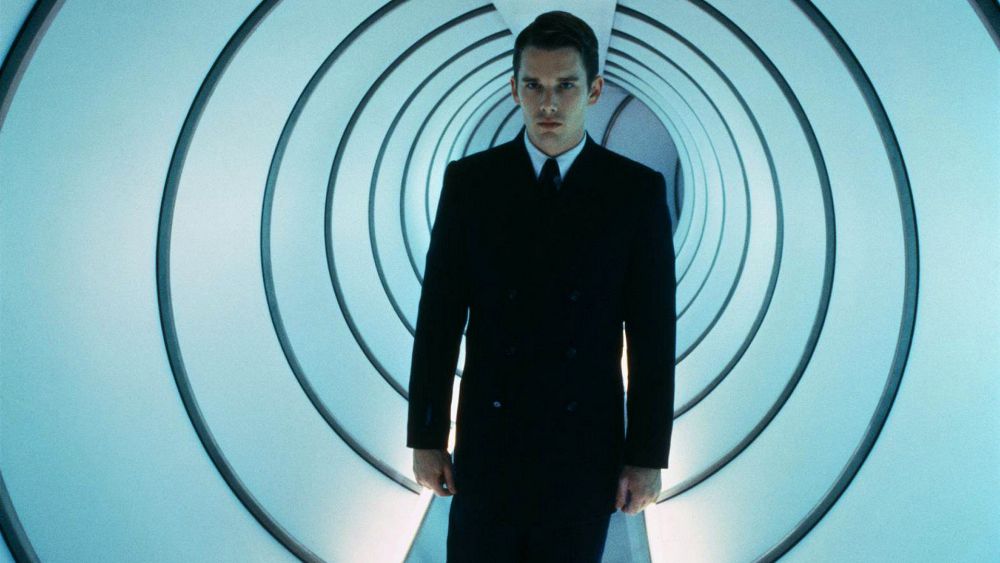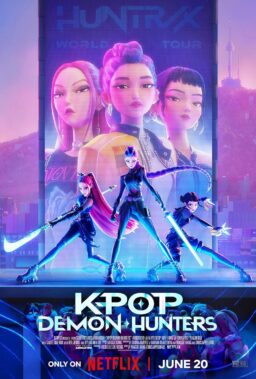This piece was published on October 2, 2019 and is being republished for Women Writers Week.
Any couple who’s visited a doctor anxious for good news about a child yet to be born recognizes a scene like this one, but with a twist. Yes, the doctor assures them, he can remove any chance their future son will have a heart ailment. He can also give the boy brown hair and hazel eyes.
But while he’s concocting their child in a lab, how about eliminating any “potential prejudicial conditions” such as obesity, premature baldness, and alcoholism?
“You want to give your child the best possible start,” the doctor says in the 1997 sci-fi thriller “Gattaca.” “Believe me, we have enough imperfection built in already. Your child doesn’t need any additional burdens.”
Released while scientists were still mapping the Human Genome, “Gattaca” seems as prescient as ever, now that science has caught up to its fiction. Four clinical trials are underway in the U.S. involving a genetic editing tool called CRISPR, a “pair of molecular scissors” being tested on cells that affect cancer, lymphoma, sickle cell anemia, and childhood blindness. A scientist in China already used CRISPR on two embryos to make them resistant to HIV, possibly shortening their life expectancy. Meanwhile, an international commission wants clearer guidelines about all this, weighing the benefits of eliminating certain diseases with the ethics of crafting designer babies. The CRISPR documentary “Human Nature,” which Dan Rather executive produced and Adam Bolt directed, debuted earlier this year at the SXSW Film Festival, exploring these thorny questions.
My husband and I had our own intense meeting with a doctor when I was pregnant, where the OB/GYN jotted notes about our baby on a lined yellow pad. Our son had spina bifida, a birth defect where the spinal cord doesn’t form correctly. It affects about 1,500 infants nationwide each year, typically causing some form of paralysis. One option was prenatal surgery on his spine, a delicate procedure that at the time seemed to us too risky.
Our son is now nine, a bright and funny, energetic fourth-grader who loves Plants vs. Zombies, Godzilla, jokes, and drawing. A classmate nominated him as a role model because of his kindness. He walks—and jumps—with forearm crutches and leg braces. He also has a toxic-green wheelchair in which he proudly does wheelies and likes to scoot faster than his friends. I’ve said it before, but how he moves is such a small part of who he is that at times I think that walking is overrated.
Sometimes disability is all people can see—and it makes them uncomfortable. I remember when our son was a toddler using a gold walker decorated with superhero stickers. People were charmed, fascinated, and also pitying.
“Will he recover?” one man asked me in Target one day.
“He’s fine,” I said—and he is.
Proponents of genetic editing say it could eliminate disease, reduce medical costs, and spare people from suffering. I’m sympathetic to parents who want to save their children from pain. Our son has had two surgeries on his spine and four on the shunt that alleviates extra fluid in his brain. I would love for him to avoid another. But he’s not something broken that needs to be fixed. He’s a beautiful person whom I can’t imagine not being in the world, let alone changing a little here or there. Conversely, I don’t know how his disability has formed his personality.
Instead, I wish the world would bend more, like when we’re trying to follow signs for an accessible restroom that lead up a flight of stairs with no elevator—or for “accessible” not to have such broad interpretations.
“Gattaca” raised these questions before I ever had to face them.
The film might have flopped at the box office, grossing $12.5 million worldwide on an estimated $36 million budget, but it has a legion of fans, among them NASA scientists who in 2011 named it the best science-fiction movie ever made. (“Jurassic Park,” with its own genetic snipping, also landed among NASA’s seven favorites.) After 22 years, “Gattaca” is still a plausible, thoughtful tale of discrimination, disability, and worth set in a world where at one point genetic editing must have had good intentions.

Set in a “not-too-distant” retro-chic future, “Gattaca” shows a society where your genetic blueprint dictates your livelihood and opportunities. “We now have discrimination down to a science,” observes Vincent (Ethan Hawke), a man on the wrong side of such luck. Conceived the old-fashioned way, he’s classified as an “In-Valid” right after birth when his blood sample shows he has a heart condition, along with a likelihood of myopia and depression. The joy saps from his parents’ eyes. His mother treats him like he’s made of glass whenever he tumbles in the yard. He’s deemed too much of an insurance risk to join “Valid” children on the playground. Downtrodden, his parents visit a geneticist (Blair Underwood, one of a handful of people of color in the cast) to discuss creating their second child, Anton, with more advantages.
Anton grows taller than Vincent, doesn’t need glasses, and waits for the world to unfold to his liking. Vincent, meanwhile, falls in love with space travel. He studies planets, does chin-ups, and stubbornly seeks out how to pursue a goal his family is convinced is impossible. Tired of hearing how sickly he is, he believes he has value, so much so that he’s willing to subvert the system to prove it, even if it’s just to himself.
Relegated to janitorial jobs, Vincent soon makes contact with an underground entrepreneur (Tony Shalhoub) who matches him with Jerome (Jude Law), a genetically perfect man who uses a wheelchair. Vincent and Jerome quietly trade lives—along with nail clippings and samples of blood and urine—so that Vincent can game the system and get hired at the Gattaca Corporation, a space exploration company.
The mission is beside the point—Gattaca launches rockets so often, it’s practically a bus depot—as is a police investigation shortly before Vincent is set for a yearlong mission to Saturn. Someone killed the mission director who wanted to scrap the launch, and an errant eyelash tips off the cops that an In-Valid is passing as someone they’re not. The mystery adds dramatic tension, especially when one detective turns out to be Anton (Loren Dean), all grown up. But it’s more a mechanism to explore how well we know one other. What qualities we value. How we’re prisoners of our own beliefs.
“No one exceeds his potential,” Gattaca’s Director Josef (Gore Vidal) tells the police, dismissing the thought that a person might be misclassified. “It simply means we did not accurately gauge his potential in the first place.”
Writer/director Andrew Niccol (“The Truman Show”) made his debut with “Gattaca,” where he posed the quandary CRISPR now raises in the title cards. One features a quote from Ecclesiastes on God’s handiwork: “Who can straighten what he hath made crooked?” The other cites Willard Gaylin of the Hastings Center, a bioethics research institute founded in 1969 in Garrison, N.Y.: “I not only think that we will tamper with Mother Nature. I think Mother wants us to.”
That kind of thinking scares the hell out of me.
Invention creates from chaos, noted Frankenstein author Mary Shelley, whom I can imagine would have some frightful thoughts on genetic tampering. Sometimes chaos is where beauty lies. On one hand, scientific advancements can be a blessing. The trouble arises when people presuppose there’s a problem or difficulty where there isn’t one.
The value of “Gattaca” is not just in showing Vincent’s determination, which cracks whenever he’s close to being discovered. It’s depicting how this Valid/In-Valid business affects everyone. Jerome is the only “Gattaca” character who uses a wheelchair (one cop wincingly calls him “crippled”), but he’s not the only one with a disability. Vincent strikes up a romance with Irene (Uma Thurman), another Gattaca employee with a heart ailment who believes what she’s been told about her limits. Irene first gives Vincent a strand of her hair, so he can learn her genetic baggage and decide if he wants to bother. He wins her over when he drops it and says, “The wind caught it.” He wants to discover her without preconceptions. “They’ve got you looking so hard for any flaw that after a while, that’s all you see,” he says. As they fall in love, she takes him to hear a pianist who has twelve fingers—all the better to play masterpieces.
Perfection might be this world’s golden ticket, but it’s a burden. People in “Gattaca” sneak off to kiosks to test new beaus with the remnants of a kiss. Job interviews are nonexistent, replaced with urine tests and blood samples. Refuse, and an employer will check a handprint from a doorknob or the licked seal of an envelope, wondering what an applicant has to hide. Anton, full of entitlement, can’t fathom how Vincent pushes himself farther than predicted. Jerome never imagined that much. He confides how he stepped in front of a car, causing his paraplegia, because he despaired over what he saw as his unachieved potential. Even after Vincent tells him paralysis wouldn’t matter in space, all Jerome can say is that he’s afraid of heights. Helping Vincent gives him peace and purpose, enough to finally dream.
When “Gattaca” was released, part of its marketing campaign included advertisements for people to have their children genetically engineered. Thousands of people reportedly called for the opportunity. I wonder what they would have wanted to change. As the science flies ahead, it’s worth revisiting the fiction of “Gattaca” to remember we can’t control or regulate everything, nor should we presume what’s best for others. “Everyone has power, agency and value inside of them. Just because someone walks and another person uses a wheelchair doesn’t mean one is superior to the other,” writes journalist Wendy Lu, who wears a tracheostomy tube that helps her breathe.
We all have limits as well as gifts—and what we do with our lives ultimately is up to us. No matter how precise our genes might be, we can’t eliminate heartbreak and disappointment—or engineer chance.











